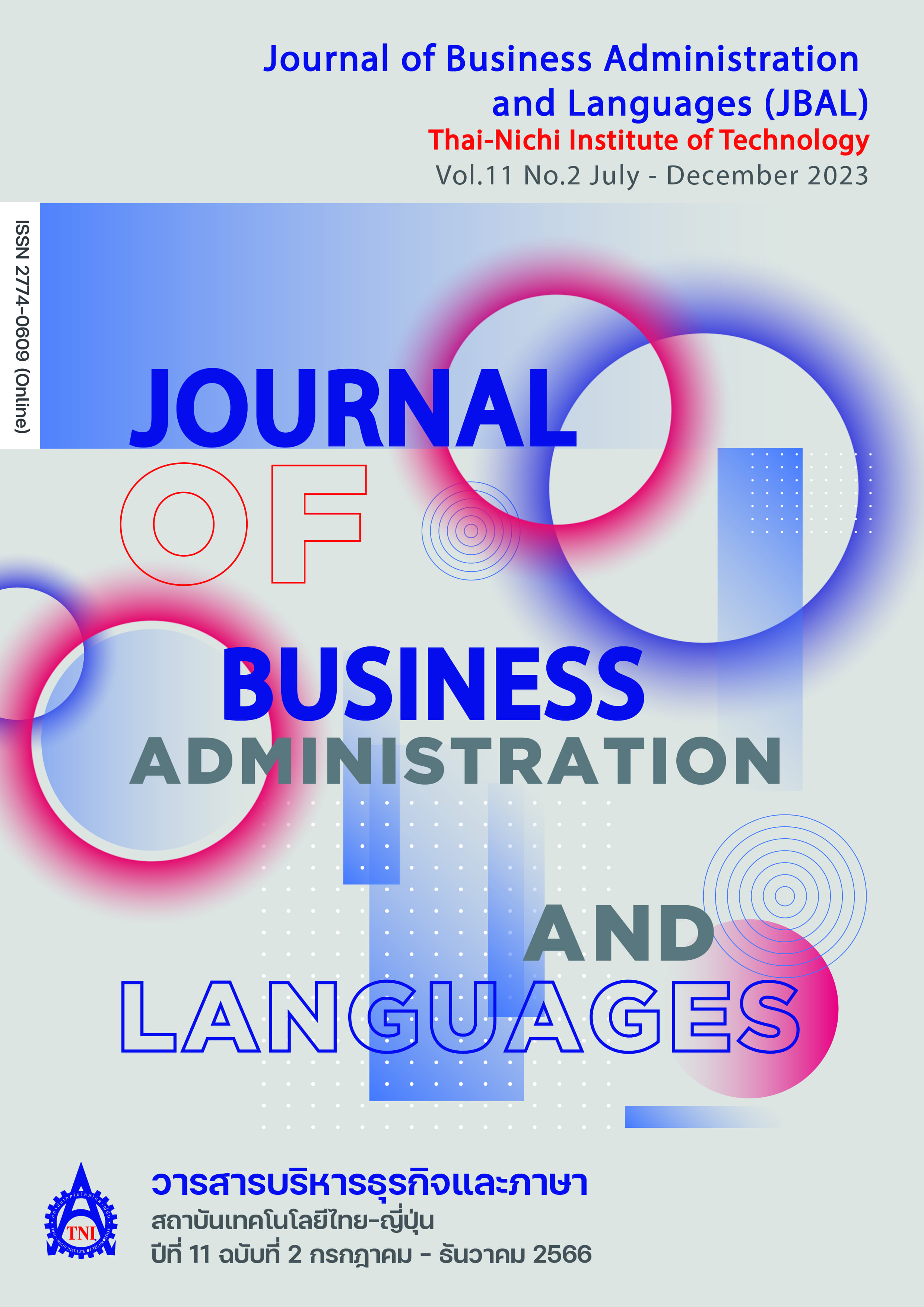อิทธิพลการสื่อสารแบบญี่ปุ่น (โฮ เรน โซ) ระหว่างการพัฒนาสมรรถนะของบุคลากรในโรงงานแบบโมโนซึคุริกับประสิทธิภาพการปฏิบัติงานของพนักงานฝ่ายผลิต กลุ่มอุตสาหกรรมเครื่องปรับอากาศ
Main Article Content
บทคัดย่อ
การศึกษาครั้งนี้มีวัตถุประสงค์เพื่อ ศึกษาการพัฒนาสมรรถนะของบุคลากรในโรงงานแบบโมโนซึคุริส่งผลต่อประสิทธิภาพการปฏิบัติงานผ่านตัวแปรคั่นกลางการสื่อสารแบบญี่ปุ่น (โฮ เรน โซ) เป็นการวิจัยเชิงปริมาณ โดยใช้แบบสอบถามเป็นเครื่องมือเก็บรวบรวมข้อมูลจากพนักงานฝ่ายผลิตในกลุ่มอุตสาหกรรมผลิตเครื่องปรับอากาศองค์กรญี่ปุ่นจำนวน 400 ตัวอย่าง เลือกกลุ่มตัวอย่างแบบใช้ความน่าจะเป็นแบบชั้นภูมิ สถิติที่ใช้ ได้แก่ ความถี่ ร้อยละ ค่าเฉลี่ย ส่วนเบี่ยงเบนมาตรฐาน การวิเคราะห์องค์ประกอบเชิงยืนยัน และการวิเคราะห์สมการโครงสร้างด้วยการวิเคราะห์เส้นทาง
ผลการวิเคราะห์ข้อมูลพบว่า การพัฒนาบุคลากรแบบโมโนซึคุริ การสื่อสารแบบญี่ปุ่น (โฮ เรน โซ) และประสิทธิภาพการทำงานอยู่ในระดับสูงมาก ค่าเฉลี่ย 4.27, 4.23 และ 4.22 ตามลำดับ ผลการตรวจสอบโมเดลแบบจำลองสมการโครงสร้างกับข้อมูลเชิงประจักษ์ของกลุ่มบริษัทญี่ปุ่นผลิตเครื่องปรับอากาศอยู่ในเกณฑ์ที่ดี โดยมีค่าดัชนี Chi-Square = 187.180, df = 29, Chi-Square/dt = 6.454, p = 0.000, CFI = 0.956, GFI = 0.911, AGFI = 0.831, RMR = 0.01 โดยมีค่าสัมประสิทธิ์ 0.68 ผลการทดสอบพบว่า การพัฒนาสมรรถนะบุคลากรในโรงงานแบบโมโนซึคุริมีอิทธิพลทางตรงต่อประสิทธิภาพการปฏิบัติงานมีค่าเท่ากับ 0.12 และพบว่า การสื่อสารแบบญี่ปุ่น (โฮ เรน โซ) มีอิทธิพลทางตรงต่อประสิทธิภาพการปฏิบัติงานมีค่าอิทธิพลทางตรงเท่ากับ 0.75 นอกจากนั้นยังพบว่า การพัฒนาสมรรถนะของบุคลากรในโรงงานแบบโมโนซึคุริมีค่าอิทธิพลทางตรงต่อประสิทธิภาพการทำงานส่งผ่านการสื่อสารแบบญี่ปุ่น(โฮ เรน โซ) มีค่าอิทธิพลทางอ้อมเท่ากับ 0.44 โดยมีค่าอิทธิพลรวมเท่ากับ 0.56 อย่างมีนัยสำคัญที่ระดับ 0.01 ดังนั้น องค์กรที่ต้องการเพิ่มประสิทธิภาพควร เพิ่มทักษะการปฏิบัติงาน ด้านความสามารถให้แก่พนักงานเพื่อเพิ่มประสิทธิภาพการปฏิบัติงาน และสร้างวัฒนธรรมการสื่อสารแบบญี่ปุ่น (โฮ เรน โซ) แล้วถ่ายทอดวิธีการปฏิบัติงานให้พนักงานทุกคนทราบและนำไปปฏิบัติเพื่อเพิ่มประสิทธิภาพการปฏิบัติงานอย่างยั่งยืน
Article Details

อนุญาตภายใต้เงื่อนไข Creative Commons Attribution-NonCommercial-NoDerivatives 4.0 International License.
นโยบายการรับบทความ
กองบรรณาธิการวารสารสถาบันเทคโนโลยีไทย-ญี่ปุ่น มีความยินดีรับบทความจากอาจารย์ นักศึกษา และผู้ทรงคุณวุฒิในสาขาบริหารธุรกิจและภาษา ที่เขียนเป็นภาษาไทยหรือภาษาอังกฤษ ซึ่งผลงานวิชาการที่ส่งมาขอตีพิมพ์ต้องไม่เคยเผยแพร่ในสิ่งพิมพ์อื่นใดมาก่อน และต้องไม่อยู่ในระหว่างการพิจารณาของวารสารอื่นที่นำส่ง ดังนั้นผู้สนใจที่จะร่วมเผยแพร่ผลงานและความรู้ที่ศึกษามาสามารถนำส่งบทความได้ที่กองบรรณาธิการเพื่อเสนอต่อคณะกรรมการกลั่นกรองบทความพิจารณาจัดพิมพ์ในวารสารต่อไป ทั้งนี้บทความที่สามารถเผยแพร่ได้ประกอบด้วยบทความวิจัย ผู้สนใจสามารถศึกษาและจัดเตรียมบทความจากคำแนะนำสำหรับผู้เขียนบทความ
การละเมิดลิขสิทธิ์ถือเป็นความรับผิดชอบของผู้ส่งบทความโดยตรง บทความที่ได้รับการตีพิมพ์ต้องผ่านการพิจารณากลั่นกรองคุณภาพจากผู้ทรงคุณวุฒิและได้รับความเห็นชอบจาก กองบรรณาธิการ
ข้อความที่ปรากฏภายในบทความของแต่ละบทความที่ตีพิมพ์ในวารสารวิชาการเล่มนี้ เป็น ความคิดเห็นส่วนตัวของผู้เขียนแต่ละท่าน ไม่เกี่ยวข้องกับสถาบันเทคโนโลยีไทย-ญี่ปุ่น และคณาจารย์ท่านอื่น ๆ ในสถาบัน แต่อย่างใด ความรับผิดชอบด้านเนื้อหาและการตรวจร่างบทความแต่ละบทความเป็นของผู้เขียนแต่ละท่าน หากมีความผิดพลาดใด ๆ ผู้เขียนแต่ละท่านจะต้องรับผิดชอบบทความของตนเองแต่ผู้เดียว
กองบรรณาธิการขอสงวนสิทธิ์มิให้นำเนื้อหา ทัศนะ หรือข้อคิดเห็นใด ๆ ของบทความในวารสารวิชาการ สถาบันเทคโนโลยีไทย-ญี่ปุ่น ไปเผยแพร่ก่อนได้รับอนุญาตจากผู้นิพนธ์อย่างเป็นลายลักษณ์อักษร ผลงานที่ได้รับการตีพิมพ์ถือเป็นลิขสิทธิ์ของวารสารสถาบันเทคโนโลยีไทย-ญี่ปุ่น
หากต้องการสอบถามข้อมูลเพิ่มเติมที่
- กองบรรณาธิการ วารสารสถาบันเทคโนโลยีไทย-ญี่ปุ่น
- ฝ่ายวิจัยและนวัตกรรม สถาบันเทคโนโลยีไทย-ญี่ปุ่น
เลขที่ 1771/1 สถาบันเทคโนโลยีไทย-ญี่ปุ่น ซอยพัฒนาการ 37-39 ถนนพัฒนาการ แขวงสวนหลวง เขตสวนหลวง กรุงเทพมหานคร 10250 ติดต่อกับคุณพิมพ์รต พิพัฒนกุล (02) 763-2752 , คุณอาริสา จิระเวชถาวร (02) 763-2600 Ext. 2704 Fax. (02) 763-2754 หรือ E-mail: JBAL@tni.ac.th
เอกสารอ้างอิง
Boonyada Nasomboon. (2020). The mediating effect of kaizen event between production management in Japanese style and cost reduction in northern region industrial estate in Thailand (in Thai). Journal of Economics and Management Strategy, 7(2), 140–156.
Byrne, B. M. (2009). Structural Equation Modeling with AMOS: Basic Concepts, Applications, and Programming (2nd ed.). New York, NY: Taylor and Francis.
Daruwan Panya. (2021). Competency and knowledge management affecting working efficiency of production operator through the mediator variable of Ho Ren So: A case study of Japanese Automobile Manufacturers in Amata City Chonburi industrial estate (in Thai) (Master's thesis). Bangkok, Thailand: Thai-Nichi Institute of Technology.
Daruwan Panya, & Boonyada Nasomboon. (2022). Competency of production operator affecting working efficiency on Japanese automobile manufacturers in Amata City Chonburi industrial estate (in Thai). The 8th Thai-Nichi Institute of Technology Academic Conference (TNIAC2022), 320–326. Retrieved from https://tniac.tni.ac.th/2022/wp-content/uploads/2022/07/T
NIAC2022.pdf
Gunawan, R., Suroso, S., & Syarief, F. (2022). Effect of technology, employee competency and leadership on operational performance at Maleo Producer Platform-Madura Offshore PT. Radiant Utama Interinsco. Dinasti International Journal of Management Science, 3(4), 694–701.
Hair, J. F., Jr., Black, W. C., Babin, B. J., & Anderson, R. E. (2010). Multivariate Data Analysis (7th ed.). Upper Saddle River, NJ: Prentice Hall.
Hata, T. (2016). Factory Personnel Development in Monozukuri Style (in Thai). (B. Rojarayanont, Trans.). Bangkok, Thailand: TPA Publishing.
Hussain, M. Z. (2020). The impact of effective communication on organizational performance with moderating role of organizational culture. Retrieved from https://www.researchgate.net/publication/349160361_The_Impact_of_Effective_Communication_on_Organizational_Performance_with_Moderating_Role_of_Organizational_Culture
Imai, M. (1986). Kaizen: The Key to Japan’s Competitive Success. New York, NY: McGraw-Hill.
Industry Team. (2022, January 11). 2022-2024 Thailand Industry Outlook. Retrieved from https://www.krungsri.com/en/research/industry/summary-outlook/outlook-2022-2024
Kannan, K. S. P. N., & Garad, A. (2021). Competencies of quality professionals in the era of industry 4.0: A case study of electronics manufacturer from Malaysia. International Journal of Quality & Reliability Management, 38(3), 839–871.
Kline, R. B. (2011). Principles and Practice of Structural Equation Modeling (3rd ed.). New York, NY: The Guilford Press.
Musheke, M. M., & Phiri J. (2021). The effects of effective communication on organizational performance based on the systems theory. Open Journal of Business and Management, 9, 659–671.
Neely, A., Mills, J., Platts, K., Richards, H., Gregory, M., Bourne, M., & Kennerley, M. (2000). Performance measurement system design: Developing and testing a process-based approach. International Journal of Operations & Production Management, 20(10), 1119–1145.
Noguchi, S. (2007). Business Communication (in Japanese). Tokyo, Japan: Subarusha.
Pranee Muanmaroeng. (2020). Impacts of Work Cultures in Japanese Companies on Work Performance in 304 Industrial Park Prachinburi Province. Retrieved from http://www.advanced-mba.ru.ac.th/advanced-mba-2559/homeweb/7096-IS/Publish/2_2562/prachinburi1/no-6124100230-PCB1.pdf
Trade Policy and Strategy Office. (2022, May 27). Thailand's International Trade Situation for the Month of April 2022 (in Thai). Retrieved from http://www.tpso.moc.go.th/th/node/11727
Voss, C., Tsikriktsis, N., & Frohlich, M. (2002). Case research in operations management. International Journal of Operations & Production Management, 22(2), 195–219.


